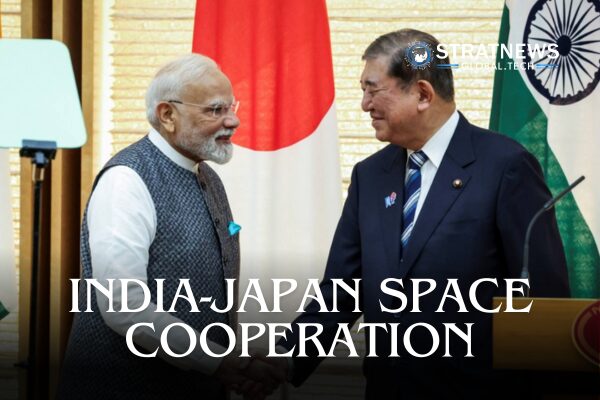At the India-Japan Summit 2025, held in Tokyo on August 29-30, the leaders of both countries came together to take their long-standing partnership to new heights, especially in the domain of space exploration.
Prime Minister Narendra Modi of India and Prime Minister Shigeru Ishiba of Japan engaged in wide-ranging talks, which focused not only on space but also on scientific innovation, technology, and mutual economic development.
This summit set the stage for a deeper collaboration between the two nations, with key agreements designed to address critical challenges like space debris and to advance joint missions.
One of the central outcomes of the summit was the strengthening of cooperation in space exploration, particularly through initiatives like the Lunar Polar Exploration Mission (LUPEX). Both leaders expressed their shared commitment to advancing space exploration and ensuring that their respective space agencies, India’s ISRO (Indian Space Research Organization) and Japan’s JAXA (Japan Aerospace Exploration Agency), work together on high-profile projects in the coming decade. This collaboration could help pave the way for scientific breakthroughs and provide a solid foundation for future lunar missions.
Key Discussions and Agreements
The talks between the two leaders highlighted the mutual recognition of the expanding role that space plays in their national security, economic prosperity, and global influence. Prime Minister Modi and Prime Minister Ishiba agreed that space exploration will be a cornerstone of their strategic partnership, with both countries leveraging their unique strengths in technology and innovation. The leaders outlined several initiatives to support this growing cooperation:
Lunar Polar Exploration Mission (LUPEX)
The LUPEX mission, a joint project between ISRO and JAXA, was a major point of discussion. As reported previously by StratNewsGlobal, the mission aims to explore the Moon’s south pole, a region rich in scientific potential, particularly with its suspected water ice deposits. Both leaders stressed the importance of the mission as a major step forward in advancing human understanding of the Moon and preparing for future deep space exploration.
Collaborative Research and Technology Sharing
A highlight of the summit was the renewed focus on research and development in areas such as quantum technologies, high-performance computing, and artificial intelligence. The Indian Beamline at KEK in Tsukuba, Japan, will continue to serve as a key platform for shared scientific research. This initiative will foster collaboration on next-generation research tools, benefiting both nations’ space programs.
Space Debris and Situational Awareness
With the rise in space debris posing a growing threat to operational spacecraft, both leaders acknowledged the urgent need for greater international cooperation in space debris management.
Japan’s experience with innovative space technologies, including tether systems and drag sails, complements India’s active space program. Together, they are looking to enhance their capabilities for space situational awareness (SSA), ensuring safer and more sustainable space operations.
Support for Space Startups
Recognizing the critical role of innovation, the two leaders discussed the Japan-India Startup Support Initiative (JISSI), aimed at fostering collaboration between tech startups in both countries. This initiative will encourage joint ventures in sectors like AI, space technologies, and data analytics, enabling young companies to expand and scale their businesses in both nations.
Growing Challenge of Space Debris
As the space sector continues to grow, one of the most pressing challenges facing both India and Japan is space debris. According to a report by US based MIT, there are approximately 35,000 tracked human-generated objects in orbit around Earth, along with hundreds of thousands of smaller fragments. These pose a serious risk to operational satellites and space missions. The two leaders agreed that addressing this problem will require significant technological innovation and international cooperation.
Japan has been exploring technologies such as tether systems and harpoon-based removal methods. Similarly, Europe’s Remove Debris project has successfully tested drag sails and harpoons, offering new approaches to tackling the debris problem.
India and Japan are committed to advancing these efforts together, with plans for joint research in space situational awareness, tracking, and managing space debris.
Experts have pointed out that while countries like the U.S. and Russia currently lead in space situational awareness, there are significant gaps, particularly in the southern hemisphere. Both India and Japan, with their growing space capabilities, are well-positioned to fill these gaps and contribute to global space safety.
India’s Role in Global Space Debris Solutions
India’s role in the global effort to manage space debris is becoming increasingly important. As one of the most active space-faring nations, India’s growing satellite fleet and space missions place it at the forefront of this global challenge. Both leaders recognized the importance of India’s contribution to space debris management, particularly as the nation expands its space activities.
Kazuto Suzuki, a professor at the University of Tokyo, in a previous conversation highlighted the strategic importance of India’s cooperation in addressing the threat of space debris, noting that “India’s active role in space exploration, coupled with its growing technological capabilities, positions it as a key partner in the global effort to address space debris and secure space for future generations.”
A Decade of Innovation and Cooperation
The India-Japan summit also underscored the commitment of both nations to advancing innovation in emerging technologies such as quantum computing, AI, and biotechnology. As part of this collaboration, the two countries have launched initiatives to promote joint research in fields like disaster management, clean technology, and geospatial sciences.
Strengthening Global Space Governance
In addition to space exploration and technological collaboration, both leaders recognized the need for strengthened governance in space. They discussed expanding their use of satellite systems for national security, satellite-based navigation, and Earth observation. Moreover, consultations for enhanced space security and SSA efforts were agreed upon, highlighting their shared commitment to maintaining a secure, transparent, and sustainable space environment.
The partnership between India and Japan is set to play a critical role in shaping the future of space exploration and addressing the growing challenges of space debris and orbital congestion.


